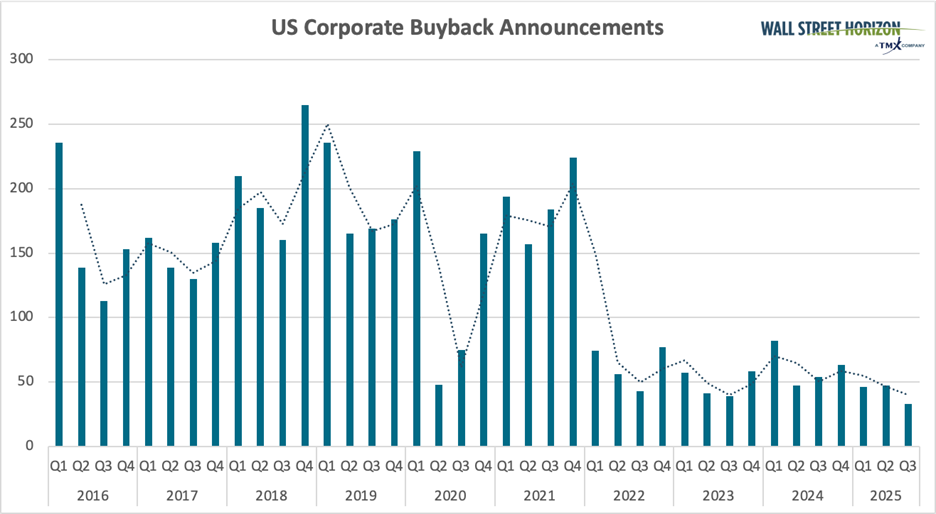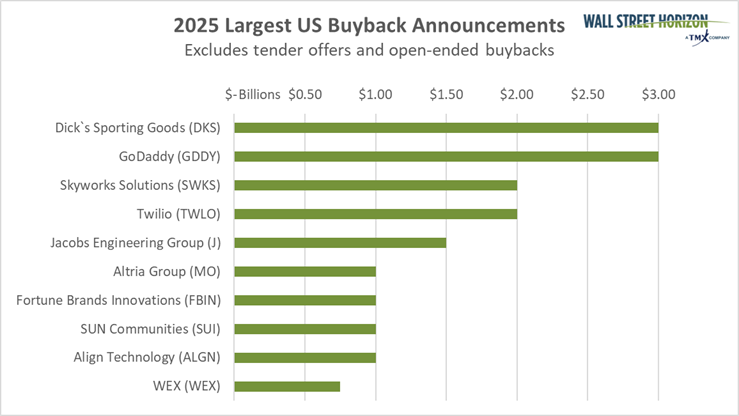Oracle stock falls after report reveals thin margins in AI cloud business
-
US companies have repurchased $1T of stock as of August 20, on track to hit a record of $1.1T by the end of 2025.
-
The top 20 S&P 500 companies continue to dominate buyback activity, making up 51.3% of total dollar level buyback authorizations in Q2 2025.
-
Wall Street Horizon saw a 10-year low in the number of companies announcing buyback plans in Q3.
American companies continue to buy back their shares at a record pace in 2025. This has not only padded balance sheets but it’s helped drive the stock market rally that’s persisted since the April 8 trough.
According to data from Birinyi Associates, U.S. companies reached $1 trillion in announced buybacks on August 20. This puts US corporations on track to hit $1.1 trillion in share repurchases by the end of 2025, which would be an all-time high.
However, that data is referring to the dollar value of announced buybacks, while the actual number of companies announcing buybacks has actually shrunk. The total number of US buyback announcements actually hit an all-time low in Q3 with only 34 announcements, the lowest in our 10 years of history. (Please note this data does not include tender offers of open-ended plans.
 Source: Wall Street Horizon. Data in the chart above represent buyback announcements from our universe of US publicly traded equities and does not include tender offers or open-ended plans.
Source: Wall Street Horizon. Data in the chart above represent buyback announcements from our universe of US publicly traded equities and does not include tender offers or open-ended plans.
Buybacks amongst S&P 500® companies have also dipped recently. In S&P Dow Jones Indices latest tally for Q2, buybacks for constituents of the index fell 20% in Q2 to $235 billion from a record of $293 billion in Q1. However, they estimate that record levels could be seen once again in Q3 results. Buybacks remain top heavy, with the top 20 S&P 500 companies accounting for 51.3%, well above the historical average of 44.5.
While the biggest repurchases include tech giants such as Apple and Alphabet, as well as major banks including JPMorgan Chase, Bank of America and Morgan Stanley, our list which excludes tender offers and open-ended buybacks has Dicks and GoDaddy at the top of the list.

Source: Wall Street Horizon. Data in the chart above represent buyback announcements from our universe of US publicly traded equities and does not include tender offers or open-ended plans.
Why Buybacks Might be In Favor
U.S. companies are undeniably awash in capital, a trend that could intensify with another robust earnings season. Robust earnings growth and tax cuts have helped line corporate coffers, while at the same time lifting the S&P 500 and Nasdaq to record levels.
Beyond simply having excess cash, buybacks offer a strategically safer avenue for corporations to deploy capital, especially amidst the current climate of elevated trade policy uncertainty. This uncertainty has demonstrably impacted business planning, as some companies reign in spending on things such as corporate travel and hiring. In such an environment, where investments in new ventures carry higher risks, share buybacks provide a reliable mechanism to return value to shareholders, signaling confidence in the company’s financial stability without committing to long-term capital expenditures. This approach also helps to buoy share prices, which can be a key factor in maintaining investor confidence.
The Bottom Line
As the Q3 earnings season begins on Tuesday, October 14 with reports from major banks, investors should closely monitor buyback announcements. An increase in share repurchases indicates corporate America’s willingness to deploy cash in a time of tariff uncertainty, as well as reward their shareholders, both which could have positive implications for the US economy.
